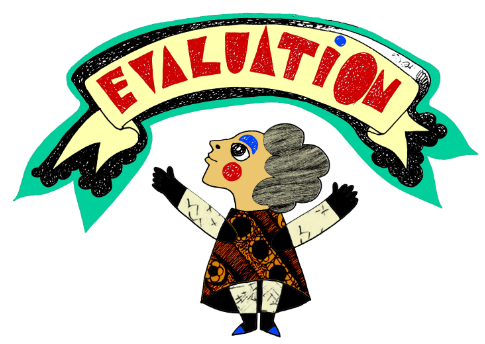Evaluation in Forum Theatre
The 6th phase in the Forum Theatre process is related to evaluation and follow-up (check out once again the Forum Theatre Presentation Chapter). In this phase we in fact measure what impact our performance had among the target group. Our aim is not to have a play but to start a change process among our beneficiaries. But how do we know we have done that?

Documenting the Forum Theatre play and the interventions
-
use a monitoring sheet for each performance (see on the following page one example)
-
write down the interventions from the public (mention scene by scene who the public changed and what solution was proposed and if the public validated it or not)- please include briefly all the interventions that the public made (for each of the performances you have)
Evaluation (suggestions in this sense)
Evaluation of your team and their process: (have discussions with them in this sense during the preparation phase and also after each performance – what went well, what not so much, what could be improved to increase the impact, what changes need to be make (if needed) in the construction of the play.
Evaluation of the public:
Suggestions
-
The transfer phase in the Joker’s work is very important!!! At the end, before the closure, the Joker asks the public how they can use all these ideas in their own community, or what they have learnt from this performance – let more members of the public share their ideas (they can be briefly written in the observation sheet mentioned in the documentation) ;
-
All the team members and the other volunteers go in the public after the performances and talk with them and ask directly how they feel about it, how they are affected by the problem and what they want to do about it? (after that share in the team what impressions you collected from the public)
-
Post large sheets of paper outside the location and people can write on them after they leave the performance (Questions should be related to the topic of your play and should be no more than 3-4)! Examples: What will you do the next time you are involved in a similar situation in your community? With what feelings or thoughts do you leave this event? What is the first thing you want to do in relation with this problem? What do you think is the most important solution that should be implemented? What should the community do about it? What do you think the authorities should do?
-
The same questions as before (together with some others connected with the problem) can be made into a short evaluation form and the Joker can mention at the end that some volunteers will come and ask public members a few questions (and to support the initiative) – send volunteers to up to 10 audience members and have a small 1 on 1 interview
-
You can create an evaluation form (as mentioned before) that is already on the seat the person will sit on and they can fill it individually and give it to the team at the end of the performance
Ideas for longer term evaluation
Depending on the location you can check with the community leaders or facilitators (if you are in a school, or in a rural area, or you went to a concrete group) what changes they observe in the community in relation with that specific problem from the attendance list at the performance – you have the contact details and you can contact some of the spectators (via mail or phone) and invite them to some meeting to discuss the problems and changes afterwards – or to ask them directly via mail or phone (post performance impact evaluation )




